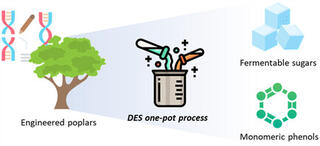Engineered poplar enhances efficiency of one-pot biorefinery process

Background/Objective
Lignocellulosic biomass is an abundant renewable resource that could provide fuels and chemicals for a bioeconomy, but the complexity of plant cell wall structure limits utilization. Treatment with environmentally safe and inexpensive deep eutectic solvents (DES) is a promising technique for recovering the three main cell wall polymers: cellulose, hemicellulose, and lignin. Research has also focused on genetic engineering to produce lignin that is easier to deconstruct. Here, scientists evaluated three transgenic poplars with distinct lignin modifications to assess how this tailored lignin chemistry influences fractionation and sugar release in DES-based conversion.
Approach
Researchers applied a one-pot process integrating DES treatment and enzymatic hydrolysis to three transgenic poplar lines engineered to redirect carbon flux away from the lignin biosynthetic pathway (MdCHS3, QsuB, and AT5). Biomass was fractionated prior to conversion into fermentable sugars and phenolic compounds were produced by hydrogenolysis of residual solids. Yields of fermentable sugars and lignin-derived phenolics were analyzed in relation to lignin characteristics of the three transgenic lines and wild-type (WT) trees.
Results
All engineered lines exhibited higher fermentable sugar yields than WT. QsuB poplar achieved the highest glucose conversion yield of 91.3% (vs 73.0% from WT). AT5 and MdCHS3 lines demonstrated glucose yields of 86.7 and 84.7%, confirming reduced biomass recalcitrance. Residual lignin was converted into phenolic compounds with comparable yields across all lines.
Significance/Impact
Findings demonstrate that engineered poplar lines are superior feedstocks for sugar conversion and provide a rich resource for phenolic production, enhancing operational and economic viability of an integrated biorefinery process.
Jang, S.-K., et al., Genetically Engineered Poplar Wood Effectively Enhances the Efficiency of Deep Eutectic Solvent-Mediated One-Pot Processing. ChemSusChem, 18, e202500891. (2025). [DOI:10.1002/cssc.202500891]